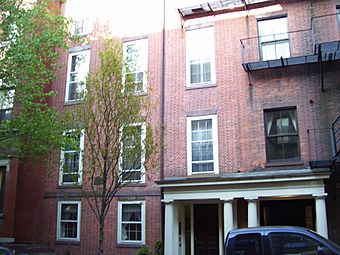Charles Sumner House facts for kids
|
Charles Sumner House
|
|
|
U.S. Historic district
Contributing property |
|
 |
|
| Location | 20 Hancock Street, Boston, Massachusetts |
|---|---|
| Built | 1806 |
| Architectural style | Federal |
| Part of | Beacon Hill Historic District (ID66000130) |
| NRHP reference No. | 73001953 |
Quick facts for kids Significant dates |
|
| Added to NRHP | November 7, 1973 |
| Designated NHL | November 7, 1973 |
| Designated CP | October 15, 1966 |
The Charles Sumner House is a special historic home located in the Beacon Hill area of Boston, Massachusetts. This brick house was built around 1806. It's famous because it was the home of Charles Sumner for many years. Sumner (1811–1874) was a very strong voice against slavery. He was even attacked in the United States Senate in 1856 because of his powerful views. This event was a major moment before the American Civil War. The house was recognized as a National Historic Landmark in 1973.
Contents
About the Charles Sumner House
The Sumner House is a four-story brick building. It was built around 1806. Inside, it has a common layout for homes of that time. There's a main hall, a front room, and then a sitting room and kitchen behind it. The upper floors have similar room setups. Charles Sumner lived in this house for thirty years.
Who Was Charles Sumner?
Charles Sumner was born to parents who were against slavery. He studied law at Harvard College. Sumner became very active in the fight against slavery in the 1840s. He also became known as a great speaker.
Sumner's Fight Against Slavery
In 1848, Sumner helped start the Free Soil Party. This party was against slavery spreading into new territories. He was elected to the United States Senate in 1851. This began his more open and strong opposition to slavery in Washington, D.C..
Sumner often spoke out fiercely against those who supported slavery. His strong words led to a shocking event in 1856. He was attacked on the Senate floor by South Carolina Representative Preston Brooks. This event made people across the country feel very strongly about the issue of slavery.
After the Attack and the Civil War
After he recovered, Sumner returned to the Senate. He became a key leader of the Radical Republican group during the American Civil War. He strongly supported ending slavery for good.
After the war, during the Reconstruction Era, he worked for civil rights for formerly enslaved people. He also played a role in the effort to remove President Andrew Johnson from office.
The Charles Sumner House was named a National Historic Landmark in 1973. It was also added to the National Register of Historic Places that same year.
Images for kids
 | Madam C. J. Walker |
 | Janet Emerson Bashen |
 | Annie Turnbo Malone |
 | Maggie L. Walker |






